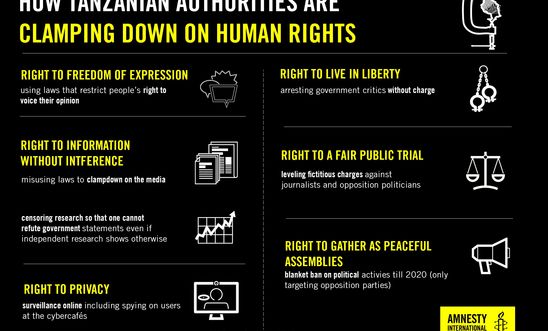
Press releases
Tanzania: climate of fear as 'ruthless' repression mounts

Bans on political activities and newspapers
Opposition party members shot
Erick Kabendera amongst journalists caught up in wave of arbitrary arrests
The ‘government must repeal all oppressive laws being used to clamp down on dissent, and urgently end human rights violations and abuses’ – Roland Ebole
Tanzania’s repression of the media, human rights defenders and opposition parties has intensified since 2015 in a ruthless clampdown on human rights, Amnesty International said in a report released today (28 October 2019).
The report, “The price we pay: Targeted for dissent by the Tanzanian State” , is the result of interviews with 68 government officials, lawyers, academics, religious leaders, and diplomats, and analysis of court decisions, national laws, government notices and orders.
It details how President John Magufuli’s government has adopted or enforced a raft of repressive laws that stifle independent journalism and severely restrict the activities of nongovernmental organisations and the political opposition, including arbitrary arrests and threats to deregister non-governmental groups.
Roland Ebole, Amnesty International’s Tanzania researcher, said:
“As President Magufuli marks four years in office next month, he must carefully reflect on his government’s record of ruthlessly disemboweling the country’s human rights framework.
“His government must repeal all oppressive laws being used to clamp down on dissent, and urgently end human rights violations and abuses."
Repressive laws, surveillance and arbitrary arrests
Since 2015, the government has stepped up censorship by banning or suspending at least five newspapers for content deemed critical. These include Tanzania’s major English language daily newspaper, The Citizen, in 2019, and four others in 2017. The Zanzibar Broadcasting Commission also shut down a radio station, Swahiba FM, in October 2015 because it reported on the annulment and subsequent re-run of the 2015 elections.
Journalists have also faced arbitrary arrests, prosecutions and enforced disappearance. In November 2017, a court convicted Bob Chacha Wangwe, a human rights activist, for “publication of false information”, because he termed Zanzibar a colony of mainland Tanzania in a Facebook post. His conviction was overturned by the High Court on the grounds that the court had not properly determined elements of the offence. Investigative journalist Azory Gwanda disappeared under mysterious circumstances in November 2017. On 29 July 2019, police arrested investigative journalist Erick Kabendera, who has been accused of sedation, publishing false information and economic crimes.
The Electronic and Postal Communications (Online Content) Regulations, adopted in 2018, require anyone with a blog or a website to pay large license fees of up to 2.1 million Tanzania Shillings (more than £700). This law also restricts online content and permits surveillance of cybercafés without judicial oversight.
Tanzania’s government also controls independent research and public access to independent statistical information using the 2015 Statistics Act, denying citizens alternative sources of independently verified information. While amendments to this law introduced this year removed criminal liability for publishing non-official statistics, the authorities still control who can gather and disseminate statistical information and determine what is factual or false.
In 2018, the Commission of Science and Technology (COSTECH) prevented Twaweza, a Tanzania-based organisation, from publishing its Sauti za Wananchi (Citizens Voices) survey, which had found that President Magufuli’s public approval rating had dropped significantly. In 2017, COSTECH and the Home Affairs Ministry prevented Human Rights Watch from holding a news conference on its report detailing abuses of Tanzanian migrant domestic workers in Oman and the United Arab Emirates.
In January 2019, Parliament amended the Political Parties Act ushering in yet more wide-ranging restrictions on the rights to freedom of association and peaceful assembly. The amendments gave the Registrar of Political Parties sweeping powers to deregister parties, demand information from political parties, and suspend party members. It also introduced a requirement for organisations and individuals to get approval before conducting civic education, infringing on citizens’ rights to access information.
In July 2016, President Magufuli announced a blanket ban on political activities until 2020 in contravention of the country’s laws. The ban has been selectively applied against opposition politicians, several having been arrested and prosecuted on trumped-up charges. In 2017, unidentified assailants shot opposition MP Tundu Lissu, and in 2018, unidentified assailants killed two officials of the main opposition party, Chadema, Daniel John and Godfrey Luena. Although police say they are investigating these killings, no arrests have yet been made.
Human Rights Watch has also published a report today - “As long as I am quiet, I am safe: Threats to Independent Media and Civil Society in Tanzania” - which backs up these findings.